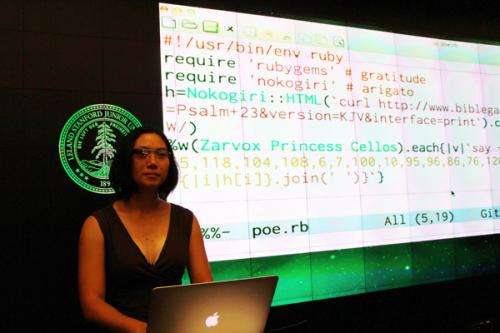Leslie Wu, a Stanford graduate student in computer science, presents her code poem, 'Say 23,' which won first place in the Stanford Code Poetry Slam.
Leslie Wu, a doctoral student in computer science at Stanford, took an appropriately high-tech approach to presenting her poem "Say 23" at the first Stanford Code Poetry Slam.
Wu wore Google Glass as she typed 16 lines of computer code that were projected onto a screen while she simultaneously recited the code aloud. She then stopped speaking and ran the script, which prompted the computer program to read a stream of words from Psalm 23 out loud three times, each one in a different pre-recorded-computer voice.
Wu, whose multimedia presentation earned her first place, was one of eight finalists to present at the Code Poetry Slam. Organized by Melissa Kagen, a graduate student in German studies, and Kurt James Werner, a graduate student in computer-based music theory and acoustics, the event was designed to explore the creative aspects of computer programming.
With presentations that ranged from poems written in a computer language format to those that incorporated digital media, the slam demonstrated the entrants' broad interpretation of the definition of "code poetry."
Kagen and Werner developed the code poetry slam as a means of investigating the poetic potentials of computer-programming languages.
"Code poetry has been around a while, at least in programming circles, but the conjunction of oral presentation and performance sounded really interesting to us," said Werner. Added Kagen, "What we are interested is in the poetic aspect of code used as language to program a computer."
Sponsored by the Division of Literatures, Cultures, and Languages, the slam drew online submissions from Stanford and beyond.
High school students and professors, graduate students and undergraduates from engineering, computer science, music, language and literature incorporated programming concepts into poem-like forms. Some of the works were written entirely in executable code, such as Ruby and C++ languages, while others were presented in multimedia formats. The works of all eight finalists can be viewed on the Code Poetry Slam website.
With so much interest in the genre, Werner and Kagen hope to make the slam a quarterly event. Submissions for the second slam are open now through Feb. 12, 2014, with the date of the competition to be announced later.
Giving voice to the code
Kagen, Werner and Wu agree that code poetry requires some knowledge of programming from the spectators.
Ian Holmes, a Stanford undergraduate studying computer science and materials and science engineering, explored Java language in a Haiku format.
"I feel it's like trying to read a poem in a language with which you are not comfortable. You get the basics, but to really get into the intricacies you really need to know that language," said Kagen, who studies the traversal of musical space in Wagner and Schoenberg.
Wu noted that when she was typing the code most people didn't know what she was doing. "They were probably confused and curious. But when I executed the poem, the program interpreted the code and they could hear words," she said, adding that her presentation "gave voice to the code."
"The code itself had its own synthesized voice, and its own poetics of computer code and singsong spoken word," Wu said.
One of the contenders showed a poem that was "misread" by the computer.
"There was a bug in his poem, but more interestingly, there was the notion of a correct interpretation which is somewhat unique to computer code. Compared to human language, code generally has few interpretations or, in most cases, just one," Wu said.
Coding as a creative act
So what exactly is code poetry? According to Kagen, "Code poetry can mean a lot of different things depending on whom you ask.
"It can be a piece of text that can be read as code and run as program, but also read as poetry. It can mean a human language poetry that has mathematical elements and codes in it, or even code that aims for elegant expression within severe constraints, like a haiku or a sonnet, or code that generates automatic poetry. Poems that are readable to humans and readable to computers perform a kind of cyborg double coding."
Werner noted that "Wu's poem incorporated a lot of different concepts, languages and tools. It had Ruby language, Japanese and English, was short, compact and elegant. It did a lot for a little code." Werner served as one of the four judges along with Kagen; Caroline Egan, a doctoral student in comparative literature; and Mayank Sanganeria, a master's student at the Center for Computer Research in Music and Acoustics (CCRMA).
Kagen and Werner got some expert advice on judging from Michael Widner, the academic technology specialist for the Division of Literatures, Cultures and Languages.
Widner, who reviewed all of the submissions, noted that the slam allowed scholars and the public to "probe the connections between the act of writing poetry and the act of writing code, which as anyone who has done both can tell you are oddly similar enterprises."
A scholar who specializes in the study of both medieval and machine languages, Widner said that "when we realize that coding is a creative act, we not only value that part of the coder's labor, but we also realize that the technologies in which we swim have assumptions and ideologies behind them that, perhaps, we should challenge."
Provided by Stanford University




















